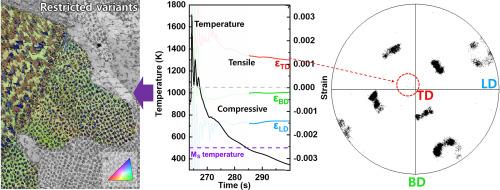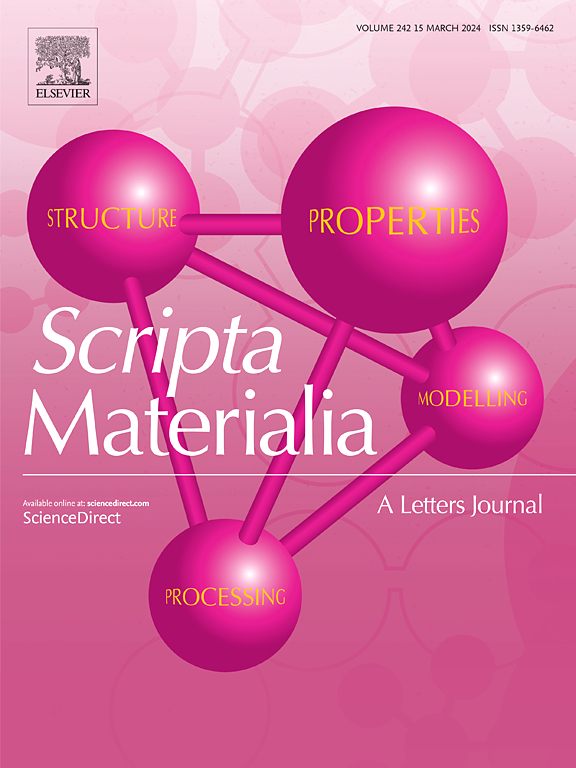Restricted variant selection in martensite transformation of maraging steel during additive manufacturing
IF 5.6
2区 材料科学
Q2 MATERIALS SCIENCE, MULTIDISCIPLINARY
引用次数: 0
Abstract
Abnormal martensitic microstructures have been observed in additively manufactured (AMed) maraging steels. We find that AMed martensite exhibits a highly biased selection of variants, predominantly concentrated on a few variants within a single prior austenite grain. Variant selection follows orientation-dependent trends, with restricted variants exhibiting Bain axes closely aligned with specific coordinate directions. Through the thermomechanical finite element analysis, thermal strains during the deposition process are computed, and it is revealed that the tensile residual thermal strain was dominant along a specific orientation. Moreover, the orientation along which the tensile strain was applied is consistent with the Bain axis of the variants that exhibited the restricted selection behavior. We conclude that the direction-dependent distribution of thermal strain during additive manufacturing suppresses the martensitic transformation when the strain is applied in tension. This finding demonstrates potential pathways for intelligent process design, enabling spatial control of microstructure and properties for specific applications.

增材制造马氏体时效钢马氏体相变的限制性变异选择
在增材制造(AMed)马氏体时效钢中观察到异常的马氏体组织。我们发现,AMed马氏体表现出高度偏倚的变体选择,主要集中在单个奥氏体晶粒中的几个变体上。变异选择遵循方向依赖的趋势,限制性变异显示贝恩轴与特定坐标方向紧密对齐。通过热力学有限元分析,计算了沉积过程中的热应变,发现在特定方向上,拉伸残余热应变占主导地位。此外,施加拉伸应变的方向与表现出有限选择行为的变异体的贝恩轴一致。我们得出结论,在增材制造过程中,应变的方向相关分布抑制了应变在拉伸下的马氏体转变。这一发现展示了智能工艺设计的潜在途径,为特定应用实现了微观结构和性能的空间控制。
本文章由计算机程序翻译,如有差异,请以英文原文为准。
求助全文
约1分钟内获得全文
求助全文
来源期刊

Scripta Materialia
工程技术-材料科学:综合
CiteScore
11.40
自引率
5.00%
发文量
581
审稿时长
34 days
期刊介绍:
Scripta Materialia is a LETTERS journal of Acta Materialia, providing a forum for the rapid publication of short communications on the relationship between the structure and the properties of inorganic materials. The emphasis is on originality rather than incremental research. Short reports on the development of materials with novel or substantially improved properties are also welcomed. Emphasis is on either the functional or mechanical behavior of metals, ceramics and semiconductors at all length scales.
 求助内容:
求助内容: 应助结果提醒方式:
应助结果提醒方式:


